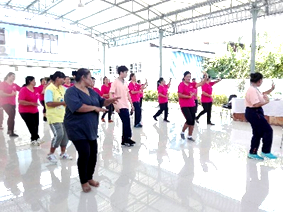Community Health Promotion by Three Aor Two Sor Principle, Wang Somboon Sub-district, Sakaeo Province
Main Article Content
Abstract
This participatory research aims to promote healthy behaviors among local people in Wang Somboon sub-district, Wang Somboon district, Sakaeo province, by practicing the principle of Three Aor Two Sor as a major guideline. The research process employed 4 steps: 1) the researchers conducted a field study to collect data on local community’s capacity; 2) a civil societal forum was organized to address health problems, particularly those concerning excessive weights against standard; 3) a network was established to carry out research to identify activity guidelines; and 4) four activities under the Three Aor Two Sor principle were implemented, which included healthy eating education, exercise for good health, effective ways to kill stress, and saying goodbye to alcohol and smoking. The data are interpreted and recommendations were suggested for joint activity development. The sample group included 51 local people in Wang Somboon sub-district participating in 4 Three Aor Two Sor activities. Subsequently, a follow-up on health conditions among the participants was conducted. The findings indicated that 37 out of 40, lost weight while the normal weight group increased from 9 to 12. The research conclusions are as follows: 1) established the health promotion network in Wang Somboon sub-district; 2) applied the principle of Three Aor Two Sor and health promotion activities to improve the health of the samples in this area; and 3) implemented the strategies and guidelines of health promotion such as pamphlets on appropriate eating habits and initiating the Three Aor Two Sor Day, which highlights good health among people in local communities for life.
Article Details

This work is licensed under a Creative Commons Attribution-NonCommercial-NoDerivatives 4.0 International License.
Area Based Development Research Journal values copyright protection and licensing to safeguard author rights and facilitate the appropriate dissemination of research. Our policies ensure openness, accessibility, and attribution. Authors retain copyright ownership, and articles are published under a Creative Commons Attribution License (CC BY), allowing sharing, adaptation, and proper attribution. Authors have the freedom to publish under the CC BY license, granting broad reuse and distribution permissions. The journal supports posting articles on third-party repositories, adhering to institutional and funding restrictions. Author guidelines detail copyright and licensing requirements, empowering authors with knowledge about their rights and responsibilities. These policies cultivate an environment of collaboration, openness, and responsible sharing, benefiting authors and the research community while honoring intellectual property rights.
References
Chanrerk, D. (2018). The study of behavioral modification among villagers to reduce cancer, hypertension, Cardiovascular diseases by applying the 7 steps of the Department of Health Education: A case study of the Ta-Sawang subdistrict, Muangsurin district, Surin province. Nakhon Racth Med Bull, 40(1), 47-54. (in Thai).
Department of Mental Health. (2006). Relaxation techniques. Retrieved September 10, 2018, from https://www.dmh.go.th/news/view.asp?id=1012. (in Thai).
Division of non-Communicable Disease. (2018). Situation on NCDs prevention and control in Thailand. Retrieved January 21, 2020, from https://www.thaincd.com/document/file/download/paper-manual/NCDUNIATF61.pdf. (in Thai).
Division of non-Communicable Disease. (2019). Number and morbidity 2016-2018 (Hypertension, Diabetes Mellitus, Cardiovascular disease, Cerebrovascular disease and COPD). Retrieved January 21, 2020, from https://www.thaincd.com/2016/mission/documents-detail.php?id=13684&tid=32&gid=1-020. (in Thai).
Duangkaew. T, & Sirasoonthorn, P. (2017). An application of Marshall H. Becker’s Health Belief Model [HBM] in the study of hypertension patients in urban communities in Phitsanulok. Journal of Community Development Research, 10(3), 101-113. (in Thai).
Hfocus. (2018a). Thai died by NCSs 37 person per hour – Prevention and control complications. Retrieved September 15, 2018, from https://www.hfocus.org/content/2018/08/16157.
Hfocus. (2018b). Thai government introduce measures against NCDs prevention - want to rank no1 in the World, Retrieved December 10, 2019, from https://www.hfocus.org/content/2018/10/16490.
Janz, N. K., & Becker, M. H. (1984). The health belief model: A decade later. Health Education Quarterly, 11(1), 1-47.
Kasempakdeepong, J., Tapsood, S., & Sacha, P. (2015). Health behavior by Three Aor Two Sor principle among people aged 15 and older in the health behavior modification village, Phetchaburi province. Journal of Health Education and Communication, 1(1), 30-42. (in Thai).
Konyanee, S., & Tassana-iem, S. (2019). The effect of the application of food, exercise, emotion, non-smoking, alcohol cessation and social support to reduce the risk of diabetes and hypertension among new risk groups. Ratchaphruek Journal, 17(2), 95-104. (in Thai).
Low, W. Y., Lee, Y. K., & Samy, A. L. (2015). Non-communicable diseases in the Asia-Pacific region: Prevalence, risk factors and community-based prevention. International Journal of Occupational Medicine and Environmental Health, 28(1), 20-6.
National Statistical Office. (2018a). Assessment of smoking behaviors and alcohol use in Thai population, 2017. Retrieved December 10, 2019, from https://www.nso.go.th/sites/2014/DocLib13/ด้านสังคม/สาขาสุขภาพ/Food_consumption_behavior_of_the_population/2560/รายงานฉบับสมบูรณ์.pdf. (in Thai).
National Statistical Office. (2018b). Assessment of smoking behaviors and alcohol use in Thai population, 2017. Bangkok: Pimdeekarnpim Co., Ltd. (in Thai).
Office of the National Sports Policy. (2019). Exercise behaviors in T.hailand – EBT. Retrieved December 10, 2019, from https://www.nspct.org/exercise/?page=charts. (in Thai).
Pantawisit, J. (2018). The development of Paslop dancing and Line dancing exercise program on blood pressure cardiorespiratory endurance system and balance of elderly persons in the ederly society of Nongkhai municipality. Journal of Education Khon Kaen University, 41(1), 101-117. (in Thai).
Papomma, S. (2015). Personal factors and adverse health behaviors with drinking and alcohol regularly in the one district of the Chaiyaphum province. Journal of the Office of ODPC 7 Khon Kaen, 22(1), 1-8. (in Thai).
Sarakshetrin, A., Chantra, R., Kwanshom, S., & Ruangdoung, L. (2017). The effects of using health behavior changing program (food, exercise, emotion, smoking, and alcohol cessation) among village health volunteers at Klongchanak, Muang district, Suratthani province. The Southern College Network Journal of Nursing and Public Health, 4(1), 253-264. (in Thai).
Thai Health. (2018). Far from NCDs by Three Aor Two Sor principle. Retrieved October 10, 2019, from https://bit.ly/2GauXgv. (in Thai).
The Queen Sirikit Health Center, Wangsomboon. (2017). Annual inspection report 2017. Sakaeo. (in Thai).
World Health Organization. (2018). Noncommunicable diseases. Retrieved September 12, 2018, from https://www.who.int/news-room/fact-sheets/detail/noncommunicable-diseases.


